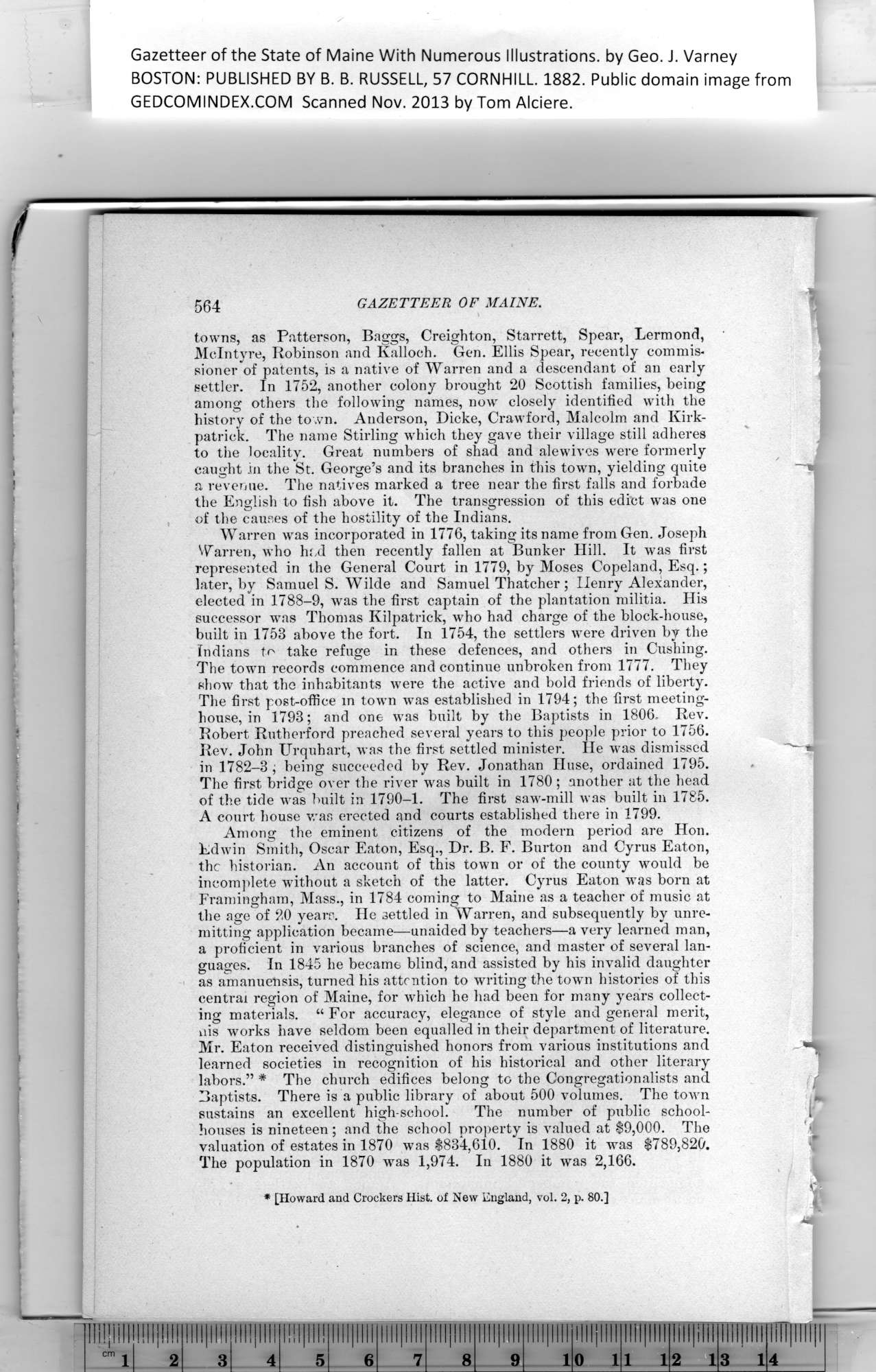|
Gazetteer of the State of Maine With Numerous Illustrations, by Geo. J. Varney
BOSTON: PUBLISHED BY B. B. RUSSELL, 57 CORNHILL. 1882. Public domain image from
564 GAZETTEER OF MAINE.
towns, as Patterson, Baggs, Creighton, Starrett, Spear, Lermond,
McIntyre, Robinson and Kalloch. Gen. Ellis Spear, recently commis-
sioner of patents, is a native of Warren and a descendant of an early
settler. In 1752, another colony brought 20 Scottish families, being
among others the following names, now closely identified with the
history of the town. Anderson, Dicke, Crawford, Malcolm and Kirk-
patrick. The name Stirling which they gave their village still adheres
to the locality. Great numbers of shad and alewives were formerly
caught in the St. George’s and its branches in this town, yielding quite
a revenue. The natives marked a tree near the first falls and forbade
the English to fish above it. The transgression of this edict was one
of the causes of the hostility of the Indians.
Warren was incorporated in 1776, taking its name from Gen. Joseph
Warren, who had then recently fallen at Bunker Hill. It was first
represented in the General Court in 1779, by Moses Copeland, Esq.;
later, by Samuel S. Wilde and Samuel Thatcher; Henry Alexander,
elected in 1788-9, was the first captain of the plantation militia. His
successor was Thomas Kilpatrick, who had charge of the block-house,
built in 1753 above the fort. In 1754, the settlers were driven by the
Indians to take refuge in these defences, and others in Cushing.
The town records commence and continue unbroken from 1777. They
show that the inhabitants were the active and hold friends of liberty.
The first post-office m town was established in 1794; the first meeting-
house, in 1793; and one was built by the Baptists in 1806. Rev.
Robert Rutherford preached several years to this people prior to 1756.
Rev. John Urquhart, was the first settled minister. He was dismissed
in 1782-3 ; being succeeded by Rev. Jonathan Huse, ordained 1795.
The first bridge over the river was built in 1780; another at the bead
of the tide was built in 1790-1. The first saw-mill was built in 1785.
A court bouse war, erected and courts established there in 1799.
Among the eminent citizens of the modern period are Hon.
Edwin Smith, Oscar Eaton, Esq., Dr. B. F. Burton and Cyrus Eaton,
the historian. An account of this town or of the county would be
incomplete without a sketch of the latter. Cyrus Eaton was born at
Framingham, Mass., in 1784 coming to Maine as a teacher of music at
the age of 20 years. He settled in Warren, and subsequently hy unre-
mitting application became—unaided by teachers—a very learned man,
a proficient in various branches of science, and master of several lan-
guages. In 1845 he became blind, and assisted by his invalid daughter
as amanuensis, turned his attention to writing the town histories of this
central region of Maine, for which he had been for many years collect-
ing materials. “ For accuracy, elegance of style and general merit,
nis works have seldom been equalled in their department of literature.
Mr. Eaton received distinguished honors from various institutions and
learned societies in recognition of his historical and other literary
labors.” 1 The church edifices belong to the Congregationalists and
Baptists. There is a public library of about 500 volumes. The town
sustains an excellent high-school. The number of public school-
houses is nineteen ; and the school property is valued at $9,000. The
valuation of estates in 1870 was $834,610. In 1880 it was $789,820.
The population in 1870 was 1,974. In 1880 it was 2,166.
1
[Howard and Crockers Hist, of New England, vol. 2, p. 80.]
PREVIOUS PAGE ... NEXT PAGE
This page was written in HTML using a program written in Python 3.2
|
